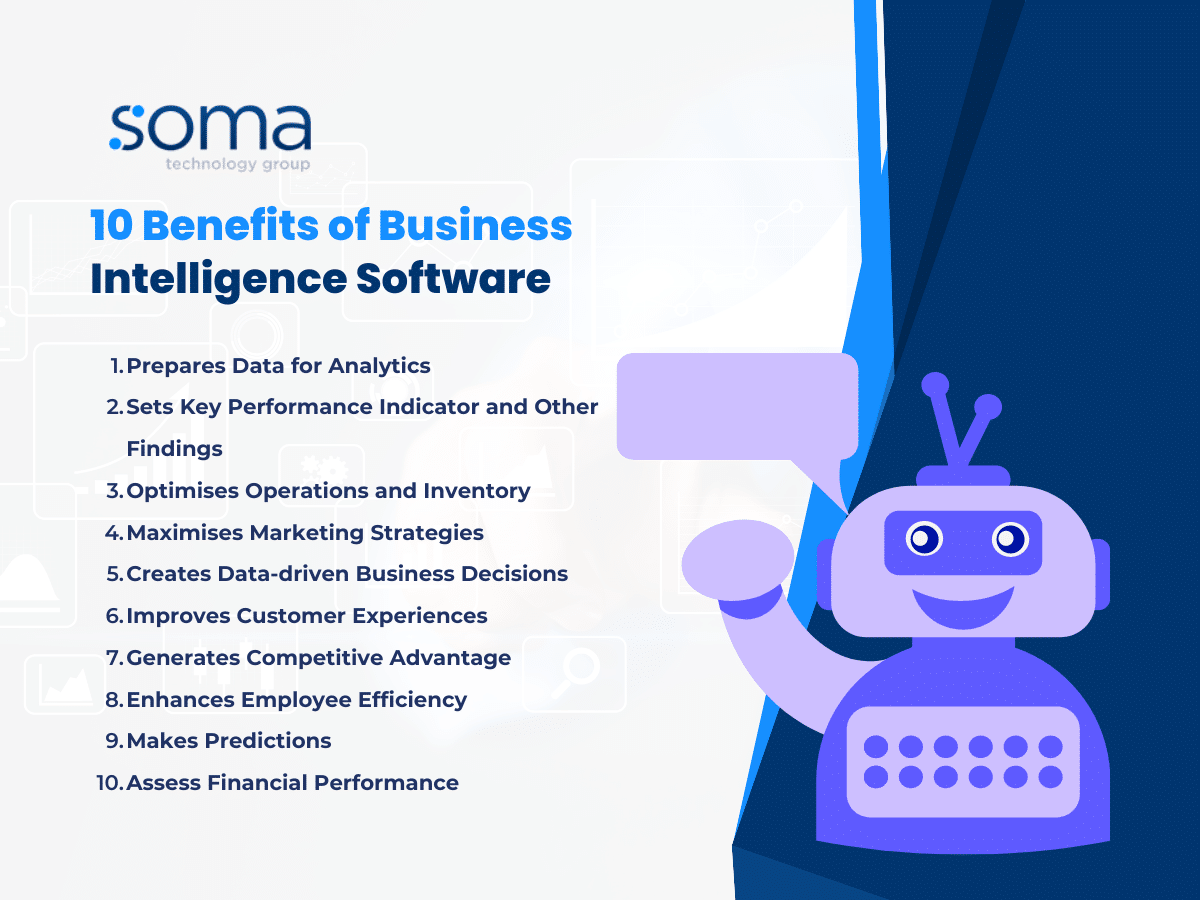Business intelligence (BI) is important for commerce to stay competitive and maximise revenue. And this tool is slowly being integrated into many businesses in Australia. In fact, according to a survey conducted by CPA Australia, business intelligence software is one of the top three technologies that more firms to use in the next 12 months in 2022.
But for those who haven’t adopted or are simply not aware of this tool, it can be difficult to understand what BI is precisely for. So, in this article, we will discuss what business intelligence software is and why it is important.
What is Business Intelligence (BI) Software, and How Does it Work?
In simple words, Business Intelligence is a software that is used by companies to collect, process, store, sort, filter, and analyse large quantities of data from both external and internal sources. The main purpose of BI is to convert from its raw form to more useful information that can be used for business decisions.
Traditionally, business intelligence is processed manually through various processes and methodologies. However, most modern business intelligence software can involve data mining, visualisation, and other tools that can transform data. It can also process large amounts of raw data, distribute it to various data warehouses, and generate reports.
10 Benefits of Business Intelligence Software
As mentioned earlier, the importance of business intelligence software to companies is incomparable. It enables businesses to utilise data from different sources and transform it into readable insights on how the business performs.
Likewise, business intelligence software can also be given you the following benefits:

1. Prepares Data for Analytics
One of the most popular benefits of business intelligence tools is their ability to process, compile, sort, and process large amounts of data. It creates cleaner and structured data that is ready for data analysis.
Likewise, these data are then turned into readable information or visual preparations such as graphs, histograms, and diagrams.
2. Sets Key Performance Indicators and Other Findings
Most business intelligence software can transform raw data into actionable insights that can help organisations make decisions. These actionable insights can then act as KPIs to businesses and help them track or measure their performance and job efficiency.
Likewise, some BI tools also automatically collect relevant data and generate KPI reports on the measured performance levels.
3. Optimises Operations and Inventory
Business intelligence tools also allow businesses to control their costs and manage inventory assets better. In a recent study conducted by Unleashed Software, they found out that most Australian fashion retailers are dangerously overstocked.
Thus, manufacturers can leverage BI software and help them operate their inventory planning based on customer orders, historical sales, shipments, and other performance data and trends. Through these data, owners can accurately moderate their inventory and know when a particular product will be low on supply. Likewise, businesses can ensure that all products will have enough stocks and identify which products have the slowest turnover, so they don’t overstock them.
4. Maximises Marketing Strategies
Another way that business intelligence is used is in marketing. As aforementioned, BI tools provide data-driven insights that businesses can leverage from. This includes marketing data such as trends, customer behaviours, and competitor insights that can be used in optimising your marketing strategy.
Likewise, BI also helps marketers identify the effectiveness of marketing plans. According to a study conducted by Next&Co, in 2022, Australian companies wasted $5.46 billion on their digital ad spend budgets.
But with BI Tools, marketers can track indicators such as traffics, conversion rates, Cost per lead, funnel conversion rates, etc. These KPIs allow companies to optimise and realign their marketing strategies based on the data generated.
5. Creates Data-driven Business Decisions
One of the top benefits of business intelligence software is data collection. BI tools collect data from various sources within or outside of organisation. Through this data, the BI provide comprehensive and accurate data analysis, enabling decision-makers to make informed and evidence-based decisions.
Likewise, with access to key metrics, trends, and performance indicators, companies can identify opportunities, optimise processes, allocate resources effectively, and mitigate risks. This data-driven decision-making approach minimises the guesswork and helps businesses make choices that are more likely to yield positive outcomes.
6. Improves Customer Experiences
As mentioned, BI tools provide insights about your customers and their behaviour, including their purchase methods, demographics, and preferences. Likewise, one use of business intelligence software is improving customer experience.
Through the above-mentioned data, a business can create a more personalised way of reaching customers. In a report called 2022 Digital Consumer Index Trends, they found out that most Australian consumers are demanding personalisation and rewarding brands who give them.
Likewise, it can also help companies know their targets. Most BI tools collect data across platforms and reveal engagement data. Marketers can adjust their target market to these audiences or the most profitable customer groups.
7. Generates Competitive Advantage
As mentioned, business intelligence helps companies become data-driven enterprises. BI software allows businesses to access real-time data from various sources, both internal and external. This timely information helps organisations stay informed about market trends, customer preferences, and competitors’ activities. By having up-to-date insights, companies can make proactive decisions and respond swiftly to changes in the business landscape.
Likewise, it also enables companies to compare their performance against industry benchmarks and competitors. By analysing market data and KPIs, organisations can discover areas where they excel and areas that need improvement. This competitive benchmarking helps companies set realistic goals, identify best practices, and implement strategies to outperform their rivals.
This allows them to improve their ROI, understand consumers more, improve their business processes, and identify and fix any issues before they arise.
8. Enhances Employee Efficiency
Today, data is no longer restricted to executives and decision-makers. Employees without technical skills and experience can also receive, access, and analyse data. However, this often results in data mishandling, misinformation, and incorrect decision-making.
But with BI tools, employees can now handle, analyse, and generate data easily. They can even automate report-making, allowing them to make use of their time better. Likewise, this gives them the autonomy to analyse an issue and make decisions independently. This makes them feel seen, heard, and connected with the company.
Likewise, BI software can improve the employee experience through data dashboards that provide precise and result-oriented tasks. This helps them work on defined parameters.
9. Makes Predictions
One of the best benefits of business intelligence software is its ability to make predictions. Most BI tools can integrate machine learning algorithms and analyse historical data, which can reveal future trends and market demands before the competition catches on.
Likewise, most modern tools can create what-if scenarios, predict future events, and identify recurring trends in the business, helping companies mitigate risks and prevent any issues in the future.
10. Assess Financial Performance
Another benefit of using business intelligence software in a business is its capability to produce an accurate and detailed financial picture of the company. Through these, companies can inform the rest of the company about its financial performance. This also allows them to identify improvement areas, develop better strategies, and create financial plans for a better ROI.
Start Using Business Intelligence Software With SOMA!
In conclusion, using BI undeniably help your organisation. It gives you a competitive advantage, help you optimise your strategies, and mitigate risks. If your company isn’t using business intelligence software, you miss all these fantastic advantages.
So, what are you waiting for? Get familiar with BI tools and set up your own with SOMA Technology Group. Contact us to get started!
Read other related articles:



